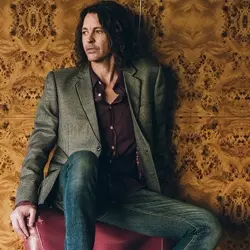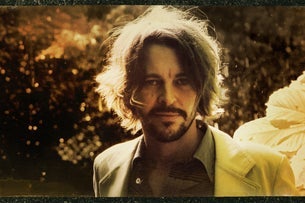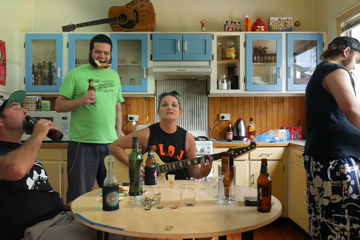 Bernard Fanning
Bernard FanningIt's been a strange journey for singer/songwriter Bernard Fanning in the last few years as he navigates the opening stages of his still-fledgling solo career. Stepping out of the huge shadow cast by Powderfinger - the Brisbane behemoth he fronted for almost two decades and who pulled up stumps in 2010 while still at the peak of their considerable powers - hasn't been a straightforward proposition, and nor should it be.
Trying to find your own way after being synonymous with such a well-established outfit for so long is a massive double-edged sword: on one hand, the extant familiarity and awareness gives a huge head start on someone starting out from scratch. On the other, there comes a certain burden of expectation as to how you're going to proceed. Add to that the fact that continually ploughing the same furrow can also breed contempt and as an artist you're effectively being pulled two ways at once.
Even Fanning's hyper-successful debut solo foray Tea & Sympathy - released back in 2005 during a Powderfinger hiatus - in a way exacerbates this dilemma. That album won multiple ARIAs and went five times Platinum, but it also took a path away from the Powderfinger rock sound that many assumed he would follow automatically when that band finally called it a day.
"This time I definitely wanted to go back to the more traditional way of writing - just write a song all the way through that you can play."
Instead he branched out with 2013's Departures, a more rock-based affair, albeit one based upon electronic beats and loops that Fanning constructed himself. Now, with his third solo album Civil Dusk, Fanning has in effect split the difference. The album features all organic instrumentation in the vein of Tea & Sympathy, but also meets the rock quota with up-tempo tracks that wouldn't have sounded out of place coming from his alma mater.
Don't miss a beat with our FREE daily newsletter
"There's this weird combination when you're writing - and this happened all the way through Powderfinger as well - where the record you're making is kind of a stepping stone to the next one, and at the same time it's like a stop sign before the next one, like, 'Okay, don't do that again'," the singer contemplates. "So there's things that do inform it and things that don't - I definitely wanted to go back to writing songs on guitar or piano all the way through, that were complete so that I could play them by myself and it felt like a good song.
"Which was not the case for Departures, where I was more than happy to have other things happening, just little stuff like sounds coming in and out and using all the technology at my disposal. But this time I definitely wanted to go back to the more traditional way of writing - just write a song all the way through that you can play. So there's a bit of both there in terms of responding to Departures and then kicking further along.
"The thing is that Departures was really different from Tea & Sympathy obviously - and that was intentional - and I was really happy for this to be really different from Departures, more back towards what Tea & Sympathy was like. It's not as 'back porch' as that and not as toe-tapping: I was really happy to have pop elbowing in on country songs on that record, while this is probably a little bit more folky. It's folk and rock, with not as much country influence in there.
"That makes it seems really fucking heavy, but the tone of the album isn't like that and that's intentional."
"But by no stretch am I a country songwriter anyway, and I wouldn't want to pretend for a moment that I am. For me it's no different - it doesn't really matter what genre it is, just whether it's a good song or not. I'm just not very good at writing a disco song."
What does stand out throughout Civil Dusk is the personal nature of the lyrics and narratives - many of which detail break-ups and hardships - although Fanning is quick to assure that this doesn't relate back to his own happily married state.
"It sounds really personal I guess, but most of the time actually I'm talking about things that I've witnessed more than really personal experience," he reflects. "Of course whatever you experience informs what you're going to write about and how you see other situations, but the idea of the thing was based on looking at the consequences of the decisions that you make and how they impact, not just immediately but over decades. Which you can only do when you're an old coot like me I guess - I couldn't have written this record 20 years ago, because I wouldn't have had the experience to do it. But I guess the personal side of it is very much about that kind of battle you have about little decisions and whether if they're benefiting you - or the people around you like your family - that they have to harm other people, then how hard it is to make those decisions.
"That makes it seems really fucking heavy, but the tone of the album isn't like that and that's intentional - I love doing that with music. I've always tended to write fairly depressing stuff lyrically, but fairly poppy music really in terms of the progressions and how things sound. And they're quite melodic as well, really whistle-able melodies. I kinda can't get away from that no matter how hard I try, although it's not a terrible disease to have I guess as a songwriter so you just work with what you've got. But I've always really liked that idea of being able to kind of - without trying to sound too academic about it - juxtapose the lyric against the music, and just having that darkness in what's being said but that lightness in what's actually played."
And the next piece in this fascinating puzzle isn't far away, a companion album Brutal Dawn due to follow Civil Dusk early next year. Although even Fanning's not yet sure exactly how the two pieces are going to interact.
"I've written a fair bit towards it so far but I haven't completed the idea yet, but part of the reason for not completing it yet is to have a little break now and then reassess what I want to say with the last lot of songs that make up the one piece," he tells. "For me anyway, when I'm in the middle of writing I don't really listen to a lot of other music and I don't even read that much a lot of the time, except for newspapers and that sort of stuff. I kinda find it hard to let other stuff in - it's kinda like before and after that I'm able to look at it and then bring other influences in and make decisions about what it all means."
















